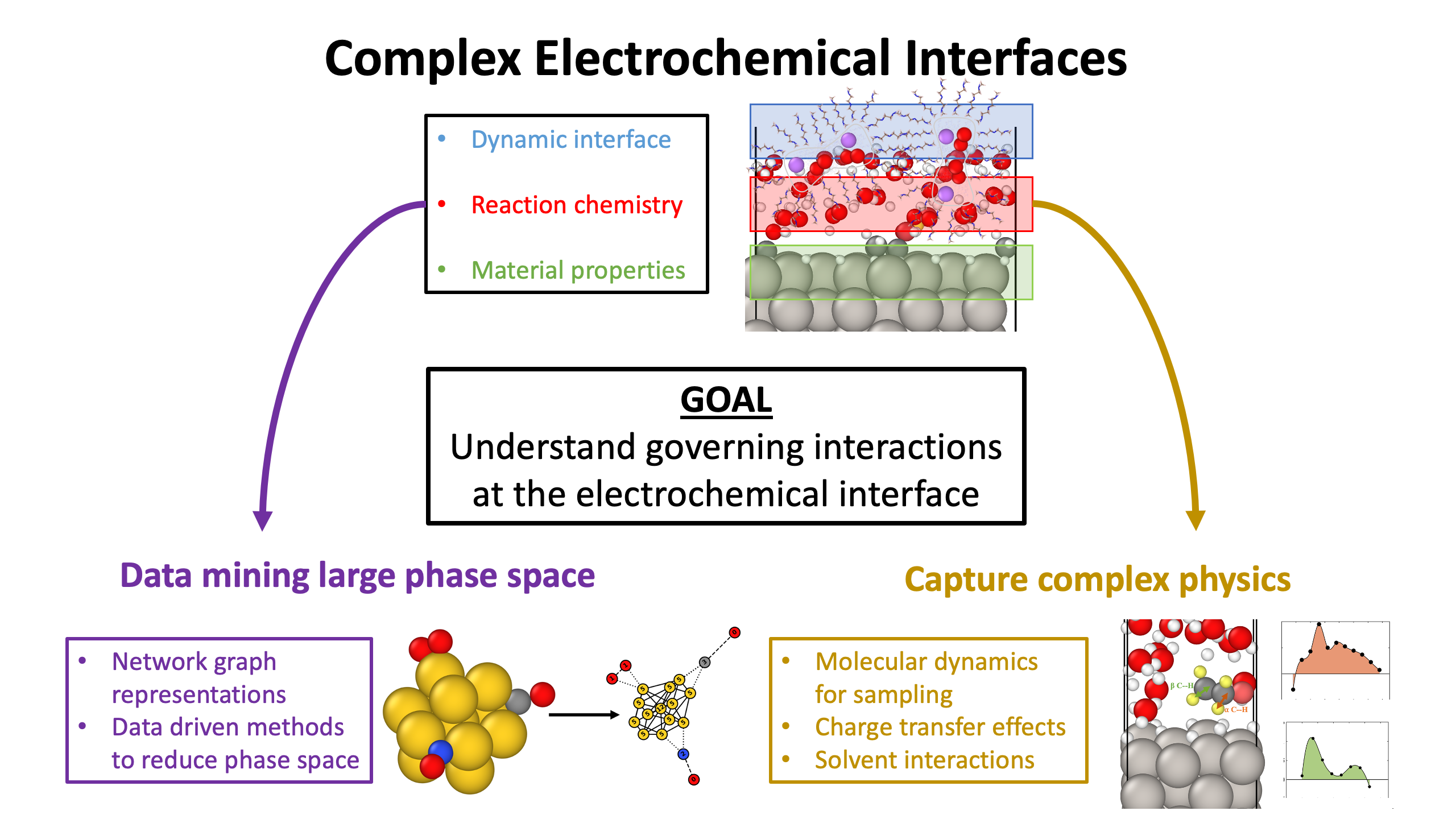2022 Annual Meeting
(2bb) Data-Driven and Physics-Based Methods for Atomistic Modeling of Electrochemical Interfaces
Author
Global climate change coupled with increasing population and energy demands has underscored the urgency to move towards a sustainability approach for overall energy economy. Electrochemical devices, given their energy efficiency, portability, and adaptability towards renewable energy sources, are at the heart of addressing these issues. However, there remain numerous key challenges, at the core of which lies developing an understanding of the governing interactions at the electrode-electrolyte interface, to expand the utilization of these devices at a global scale. The overarching goal of my independent research group will be to develop a computationally driven approach to fundamentally understand electrochemical interfaces.
Our approach will aim to identify thermodynamically relevant atomic models, as well as the physics governing the underlying chemistry at such electrified interfaces. Successful identification of such models requires accounting for numerous important interactions, resulting in the need to sample large phase space of possible atomic configurations, along with developing new methods to model complicated physical phenomena, such as charge transfer effects at electrochemical interfaces. To overcome the above challenges, we will develop versatile algorithmic approaches at the intersection of data-driven and physics-based methods. I have a strong background in: (i) developing data-driven methods to model complex heterogeneous catalytic surfaces,[1,2] and (ii) utilizing them to understand the experimentally observed product selectivity for heterogeneous electrocatalytic reactions.[3,4] Such expertise will enable my group to develop more comprehensive algorithms, that will simultaneously capture the complexities arising from (i) complex feedstocks, (ii) dynamic electrode-electrolyte interfaces, and (iii) optimization of the surface structure for next generation catalytic materials. We aim to utilize these algorithms to tackle the important challenges pertaining to electrochemical devices, such as,
(i) identifying electrocatalysts to selectively make sustainable and valuable products, such as green hydrogen, from widely available feedstocks derived from plastics and biomass.
(ii) fundamentally understanding the solid electrolyte interface (SEI) in batteries to mitigate parasitic reactions and ultimately increasing the cyclability and performance of the present-day Li-ion batteries.
(iii) identifying electrocatalysts and electrolytes to improve the efficiency and cyclability of next generation metal-chalcogen batteries.
Teaching and mentoring
A great teacher is a great student first, and academia provides the perfect space to nurture and learn from students in the research lab as well as the classroom. It is one of the best ways to give back to the society by mentoring the next generation to tackle important societal problems. As a trained chemical engineer (Bachelors, Masters, and PhD), I am prepared to teach any core chemical engineering course; however, given my research background, I prefer to teach engineering mathematics, thermodynamics, and reaction engineering. I also plan to develop two elective courses: (i) applying data science in chemical engineering, and (ii) understanding materials and interfaces in electrochemical devices: from theory to atomistic models. The first elective will demonstrate the utilization of modern-day computational tools, such as interactive Python notebooks, to apply core chemical engineering principles to real time data. The second elective will introduce principles of electrochemistry, material selection, and physics governing the fundamentals of electrified interfaces in electrochemical devices.
Mentoring has been a crucial drive for me to be on this career path, and I have been fortunate to have had the opportunity to mentor two PhD students during my graduate school. The time that we spent together has helped my mentees to become pioneering independent researchers in their fields, presenting their research at prestigious conferences such as the Fuel Cells GRC. This experience has also aided me in diversifying my own research thinking by investigating new research areas and developing unique approaches to tackle difficult problems. I look forward to learning with and mentoring the new generation of students to find innovative solutions for the global energy crisis.
Selected references:
* equal contribution, â¡ corresponding author
1. Deshpande, S.*, Maxson, T.* & Greeley, J. npj Computational Materials 6, 4981 (2020).
2. Ghanekar, G.*, Deshpande, S.*â¡, Greeley, J.â¡, Accepted Nature Communications.
3. Deshpande, S. & Greeley, J. Acs Catal 10, 9320â9327 (2020).
4. Samira, S.*, Deshpande, S.* et al. Chem Mater 31, 7300â7310 (2019)
